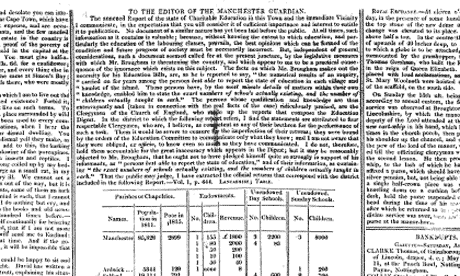Comment, as Guardian founding editor CP Scott said, is free. But the second part of his maxim holds equally true for the Guardian today: facts are sacred. In reality, they were so even before his day.
Issue number one of the Manchester Guardian, Saturday 5 May, 1821, had news on the back page, like all papers of the day. And, amid the stories and poetry excerpts, a third of that back page is taken up with, well, facts. A comprehensive table of the costs of schools in the area never before "laid before the public", writes "NH".
NH wanted his data published because otherwise the facts would be left to untrained clergymen to report. His motivation is clear: "Such information as it contains is valuable; because, without knowing the extent to which education, and particularly the education of the labouring classes, prevails, the best opinions which can be formed of the condition and future progress of society must be necessarily incorrect." In other words, if the people don't know what's going on, how can society get any better?
Publishing data has got easier since. The web has given us easy access to billions of statistics on every matter. And with it are tools to visualise that information, mashing it up with different datasets to tell stories that could never have been told before.
Publishing data has got easier since. The web has given us easy access to billions of statistics on every matter. And with it are tools to visualise that information, mashing it up with different datasets to tell stories that could never have been told before.
But it brings with it confusion and inaccessibility. How do you know where to look, what is credible or up to date? Official documents are often published as uneditable pdf files – useless for analysis except in ways already done by the organisation itself. Alternatively, sometimes an avalanche of facts is unleashed in order to bury the truth. Journalists have to walk this tightrope everyday, ensuring that the numbers we publish are right — and if we fail you let us know, often immediately.
Increasingly reporters around the world are making it their mission to make data truly free; to publish everything. We have done it with the information behind our tax gap series on corporate tax avoidance. OurFree Our Data campaign has even prompted the government to review its information access policies. And from today, we will do it with the world's best sets of data.
That is where the Data Store and the Datablog come in. Every day we will publish the raw statistics behind the news and make it easy to export in any form you like. It is about freedom of information. But it is not a one-way process – we want you to tell us what you have done with the data and what we should do with it. The facts are sacred — and they belong to all of us.
Posted byAlan Rusbridger Tuesday 10 March 2009

0 σχόλια:
Δημοσίευση σχολίου